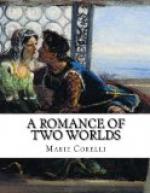“But did you not doubt—were you not inclined to think they might be wrong?” I inquired, with some astonishment.
“I knew Heliobas as a child,” the priest returned. “I knew his father and mother before him; and I have been always perfectly aware of the immense extent of his knowledge, and the value of his discoveries. If I were inclined to be sceptical on spiritual matters, I should not be of the race I am; for I am also a Chaldean.”
I said no more, and Father Paul trimmed the tapers burning round the coffin in devout silence. Again I looked at the fair dead form before me; but somehow I could not feel sad again. All my impulses bade me rejoice. Why should I be unhappy on Zara’s account?—more especially when the glories of the Central Sphere were yet fresh in my memory, and when I knew as a positive fact that her happiness was now perfect. I left the chapel with a light step and lighter heart, and went to my own room to pack up my things that all might be in readiness for my departure on the morrow. On my table I found a volume whose quaint binding I at once recognised—“The Letters of a Dead Musician.” A card lay beside it, on which was written in pencil:
“Knowing of your wish to possess this book, I herewith offer it for your acceptance. It teaches you a cheerful devotion to Art, and an indifference to the world’s opinions—both of which are necessary to you in your career.—Heliobas.”
Delighted with this gift, I opened the book, and found my name written on the fly-leaf, with the date of the month and year, and the words:
“La musica e il lamento dell’ amore o la preghiera a gli Dei.” (Music is the lament of love, or a prayer to the Gods.)
I placed this treasure carefully in a corner of my portmanteau, together with the parchment scrolls containing “The Electric Principle of Christianity,” and the valuables recipes of Heliobas; and as I did so, I caught sight of myself in the long mirror that directly faced me. I was fascinated, not by my own reflection, but by the glitter of the electric gem I wore. It flashed and glowed like a star, and was really lovely—far more brilliant than the most brilliant cluster of fine diamonds. I may here remark that I have been asked many questions concerning this curious ornament whenever I have worn it in public, and the general impression has been that it is some new arrangement of ornamental electricity. It is, however, nothing of the kind; it is simply a clear pebble, common enough on the shores of tropical countries, which has the property of absorbing a small portion of the electricity in a human body, sufficient to make it shine with prismatic and powerful lustre—a property which has only as yet been discovered by Heliobas, who asserts that the same capability exists in many other apparently lustreless stones which have been untried, and are therefore unknown. The “healing stones,” or amulets, still in use in the East,




